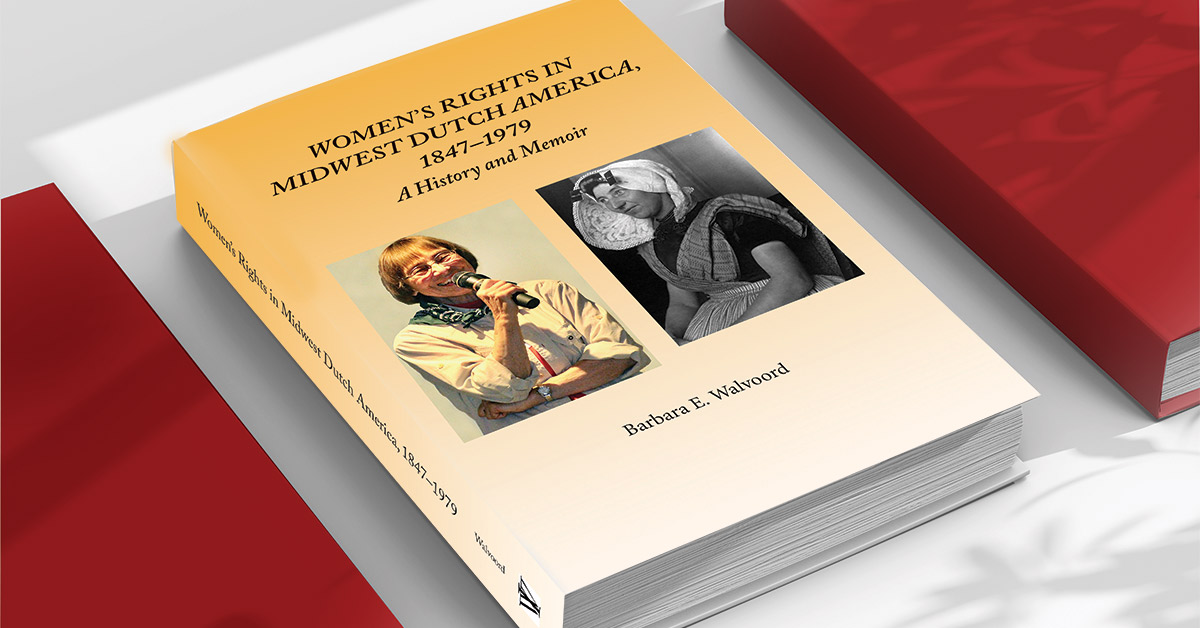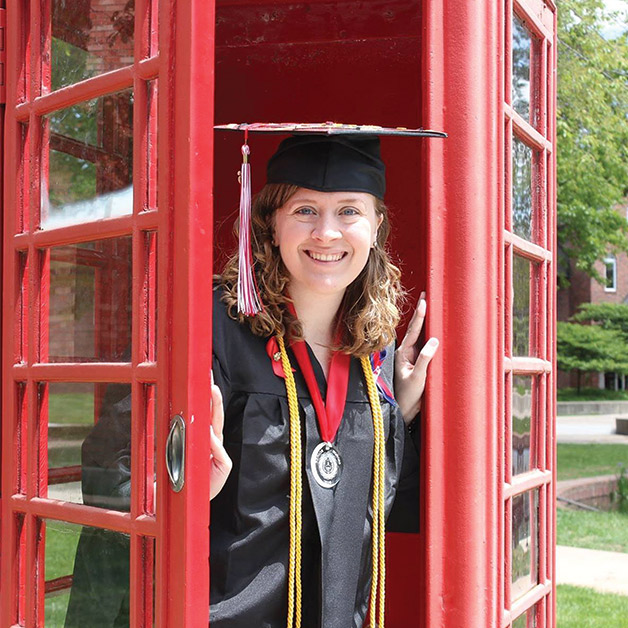 I was pleased to see a familiar name in my inbox one morning in 2022. The name was none other than Central College’s Lori Witt, Kenneth J. Weller Distinguished Professorship of the Liberal Arts and associate professor of history, whom I had asked to review a draft of my manuscript. Along with it, she sent me two senior research papers.
I was pleased to see a familiar name in my inbox one morning in 2022. The name was none other than Central College’s Lori Witt, Kenneth J. Weller Distinguished Professorship of the Liberal Arts and associate professor of history, whom I had asked to review a draft of my manuscript. Along with it, she sent me two senior research papers.
That morning, I was working on my book titled, “Women’s Rights in Midwest Dutch America, 1847-1979: A History and Memoir.” And the research papers from Witt’s former students were the perfect fit for the part of the book telling stories of women at Central and in Pella.
Witt mentored both students in their time at Central. Cindy Van Donselaar ’02 wrote, “A History of The Women’s Movement in Pella During the 1960s and 1970s” and Elizabeth Koele ’16 wrote, “A History of Social Change at Central During the 1960s and 1970s.”
I was a Central faculty member from 1966-79. I taught English composition and literature, as well as interdisciplinary women’s studies courses. The national women’s movement was at its height — some will remember Betty Friedan, Gloria Steinem, NOW, MS Magazine, Title IX and all that came with it. I worked for women’s rights in both the college and the City of Pella.
I was incorporating my own experience, archival research, and now, the research from fellow Central friends into the book I would publish in 2023.
Great Preparations
Koele came to Central from Northwest Iowa. Taking history classes from Witt, she became interested in the 1960s and ’70s due to the large amount of change in such a short period of time. During a previous grant-supported summer research project to study sustainability in the ’60s and ’70s, while reading back issues of The Ray, Koele says she came across many other things that interested her, like the student culture and other movements on Central’s campus.
Later, as she considered a senior thesis, Koele talked frequently with Witt, deciding on a theme of “change” in those decades.
“I went back to the archives, scanned, read and talked with Lori to brainstorm ideas and how to pull everything together,” Koele recalls. “We put together subtopics, then went back to my notes and the things we scanned. I wrote many drafts.”
Little did Koele know, she was being trained in the strategies and habits of a researcher.
The most difficult challenges came from the enormity and complexity of her theme — change — and the many complex social movements occurring simultaneously in the nation and on the campus. Challenging, too, were the various types of records available.
When Koele later went to graduate school in history, she felt prepared based on her experience at Central and the work she put into her senior thesis.
“I attribute a lot of my success to Central and my work with Lori,” Koele affirms. “She was great; I couldn’t have asked for a better mentor.”
Koele has continued to work in the field of public history, focusing on historical objects, exhibits and highway markers.

Elizabeth Koele ’16, pictured on graduation day at Central.
Talking to the Women
“My desk was in the toy room,” Van Donselaar recalls.
Already a mother, the Central senior communications major arranged a senior thesis in history with Witt. Building on skills gained in an earlier oral history project, Van Donselaar undertook an ambitious project to survey and interview women who had lived in Pella in the 1960s and ’70s.
A Pella native, Van Donselaar tapped her family, church and other contacts to survey or interview a variety of women with many different points of view. Her grandmother took her to a Christian Reformed Church Ladies’ Aid meeting, where many women, including the grandmother, were skeptical of the women’s movement, but the pastor said, “We need to understand this.” Van Donselaar also contacted members of other city organizations such as the League of Women Voters.
Like Koele, she combined multiple sources. She read many books on the women’s movement. She combed through her interviews, finding scenes she could use, quotes to bring the women’s own voices into the study and themes to interpret the data.
She color coded her interviews and surveys — one color for comments about church, another for comments about work and so on. She wrote ideas and information on notecards. She taped outlines to the wall (and tried to keep the kids from pulling them off). She produced a careful, scholarly report, rich with the voices of women who lived through those times.
After college, Van Donselaar worked in journalism and marketing. Much of her work was in the agriculture industry, where, as a member of a leadership team, she fought for her voice to be heard.
Cindy is now the mother of five. Through her senior research, she says, “I gained an appreciation of all the things these women went through, so that my daughters could have the choices they do.”

While juggling motherhood and her studies at Central, Cindy Van Donselaar ’02 conducted an oral history study as part of her senior thesis on Pella women’s perspectives during the 1960s and ’70s.
We Read Together
As a lifelong college teacher and mentor of college students’ research, I’m in awe of how Witt combines guidance for her students with encouragement for them as research colleagues. Her students present their research to colleagues at Central and sometimes beyond.
Witt began teaching part-time at Central while she was working on her dissertation — a study of women in conservative Protestant colleges in the 1920s and ’30s — later becoming a full-time faculty member. In 2023, she was named the Kenneth J. Weller Distinguished Professor of the Liberal Arts.
Witt was awarded the Hutch Bearce Community-Building and Faculty Leadership Award for building community and interdisciplinary perspectives, including her Stonewall riots presentation sponsored by Common Ground and her work with the Pella Historical Society. She has been History Day District Coordinator for the Historic Highways District and serves on the board and two committees for the State Historical Society of Iowa.
One of her greatest joys and challenges is reading the research on all the topics in which she teaches or mentors students. With not a lot of free time to do so, Witt says she reads right along with her students.

Lori Witt, Kenneth J. Weller Distinguished Professor of the Liberal Arts and associate professor of history, and Mark Putnam, Central president, at Witt’s installation.
Social Justice Movements at Central
Combining our research illuminates the vibrant, changing college of the 1960s and ’70s.
First, many social justice movements were occurring simultaneously: Civil Rights, anti-Vietnam, environmental, gay and lesbian liberation movements and what we then called “women’s lib.” Second, in all these movements, the Central community was aware of national developments, but became actively involved when local events directly affected students and faculty. Third, members of the community agitated for change, but in ways unique to Central, with respect, dialogue and non-violent actions — a distinct contrast to the more violent takeovers, marches and disruptions occurring at some state universities. Finally, some changes did occur, along with frustrating resistance.
One galvanizing Civil Rights event was the experience of a Central student from Ghana, who was beaten up by a gang of southern men while visiting the South to participate in Civil Rights activism. Another event was the visit of Rev. Dr. Martin Luther King Jr. to Central in 1967. President Arend Lubbers received letters from RCA members protesting this “rabble rousing” speaker. King himself received death threats, and crosses were burned along his route to Pella. Yet the 800 students and faculty, plus 500 townspeople who attended the speech gave King a standing ovation. When King was assassinated, 400 Central students joined a memorial ceremony, where President Lubbers read King’s “I Have a Dream” speech.
In the 1970s, Central hired its first Black faculty member — Rev. Wilbur Washington — who established Ebony House as a gathering space for the college’s Black students and offered Black studies courses. There was a confrontation in 1970 as Black students demonstrated, threatening to resign en masse if there were not more Black students at Central. In response, Central agreed to increase its efforts to recruit Black students, and the demonstration ended peacefully. When Black students were killed at Jackson State University, then president Ken Weller immediately met with Black students to plan appropriate actions. Despite this progress, Black students sometimes experienced discrimination and hostility, on and off campus.
In the case of the Vietnam War, the galvanizing incidents were the draft lottery in 1969, where some Central students faced their own induction into the war, and the death in Vietnam of Paul Wilson, son of a Central faculty member. One of the students who was killed by police gunfire during a student anti-Vietnam War demonstration at Kent State University had been enrolled at Central before transferring to Kent State. A candlelight vigil for Kent State students brought out so many students and faculty that the line of marchers extended from campus to the Tulip Toren. A group of faculty withheld their telephone tax, which Congress had designated specifically for the war, and they wrote a letter to the Pella newspaper explaining their actions.
An early form of the campus women’s movement began with students protesting the different rules for curfew and dress that were imposed on female but not on male students — circumstances that directly affected students’ lives. Women’s studies courses began, and a faculty-student women’s committee published a column in The Ray. The college’s administration investigated whether women faculty were treated fairly in salary and promotion. Weller appointed Rev. Frances De Jong ’57 as chaplain, who had a divinity degree but could not yet be ordained in the Reformed Church. Weller appointed Marjorie Giles as assistant dean and later dean of students, when most women were boxed in as deans of women. Weller also appointed a local business owner, Marlys Korver De Wild ’56, to the Board of Trustees.
The 1972 national Title IX law mandated equality for women in sports. Coach Gary Boeyink ’59, sent to a conference on Title IX by President Weller, returned eager to begin a more robust women’s sports program.
In short, the research revealed a close-knit college community, aware of, and sometimes directly affected by, social justice movements in the surrounding society. The college worked out its own changes, with students, faculty and administrators all contributing, negotiating difficult issues — sometimes with high emotions or confrontations, setbacks and failures, always moving forward in a spirit of mutual respect and dialogue.












To encourage serious, intellectual discourse on Civitas, please include your first and last name when commenting. Anonymous comments will be removed.
Comments are closed.